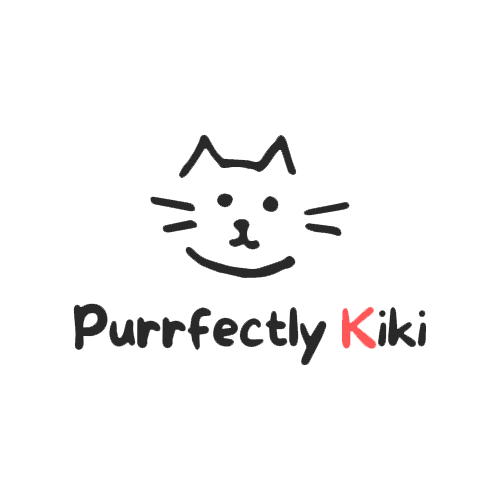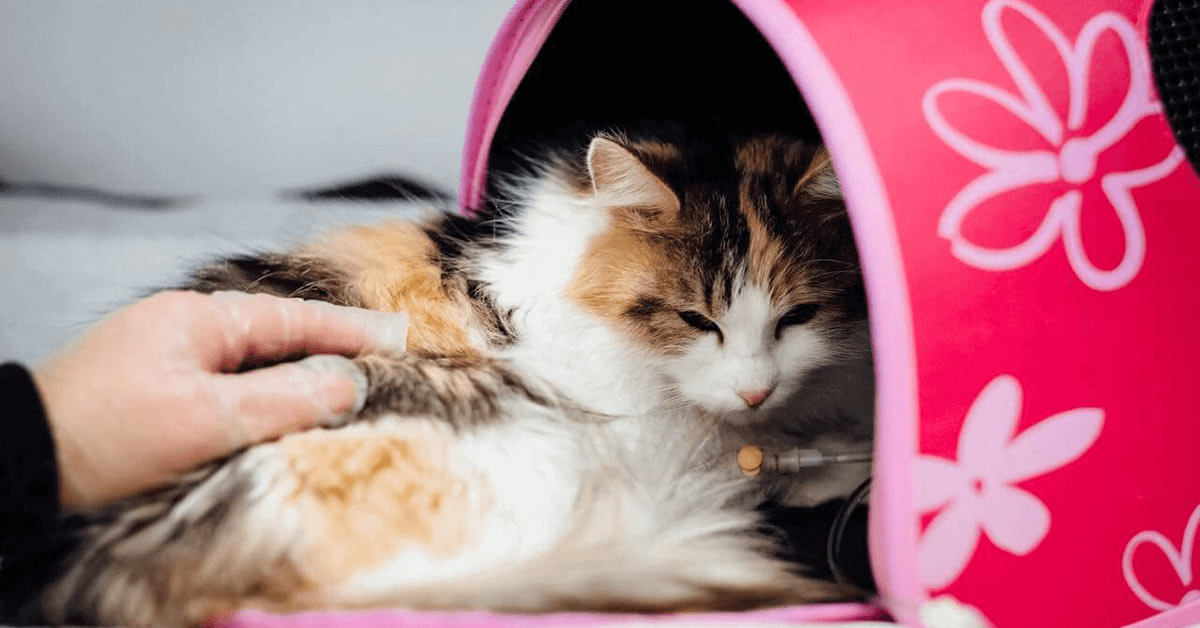Here’s How Cat Food Affects Your Cat’s Health – 5 Key Aspects
We as purr-ents have the obligation to take very good care of our furry babies, starting with their food and how it can affect their health.
With a whole host of information out there, it is becoming increasingly difficult to gauge what is required in terms of nutrients.
So, without wasting any time, let’s see what you should pay attention to the next time you’re shopping for your kitty’s next meal.
Daily Nutritional Allowance for Cats – Chart
| Nutrient | Kittens |
|---|---|
| Water | as much as possible |
| Vitamins | 8 mgs |
| Minerals | 1000 mgs |
| Protein | 10 gms |
| Fat | 4 gms |
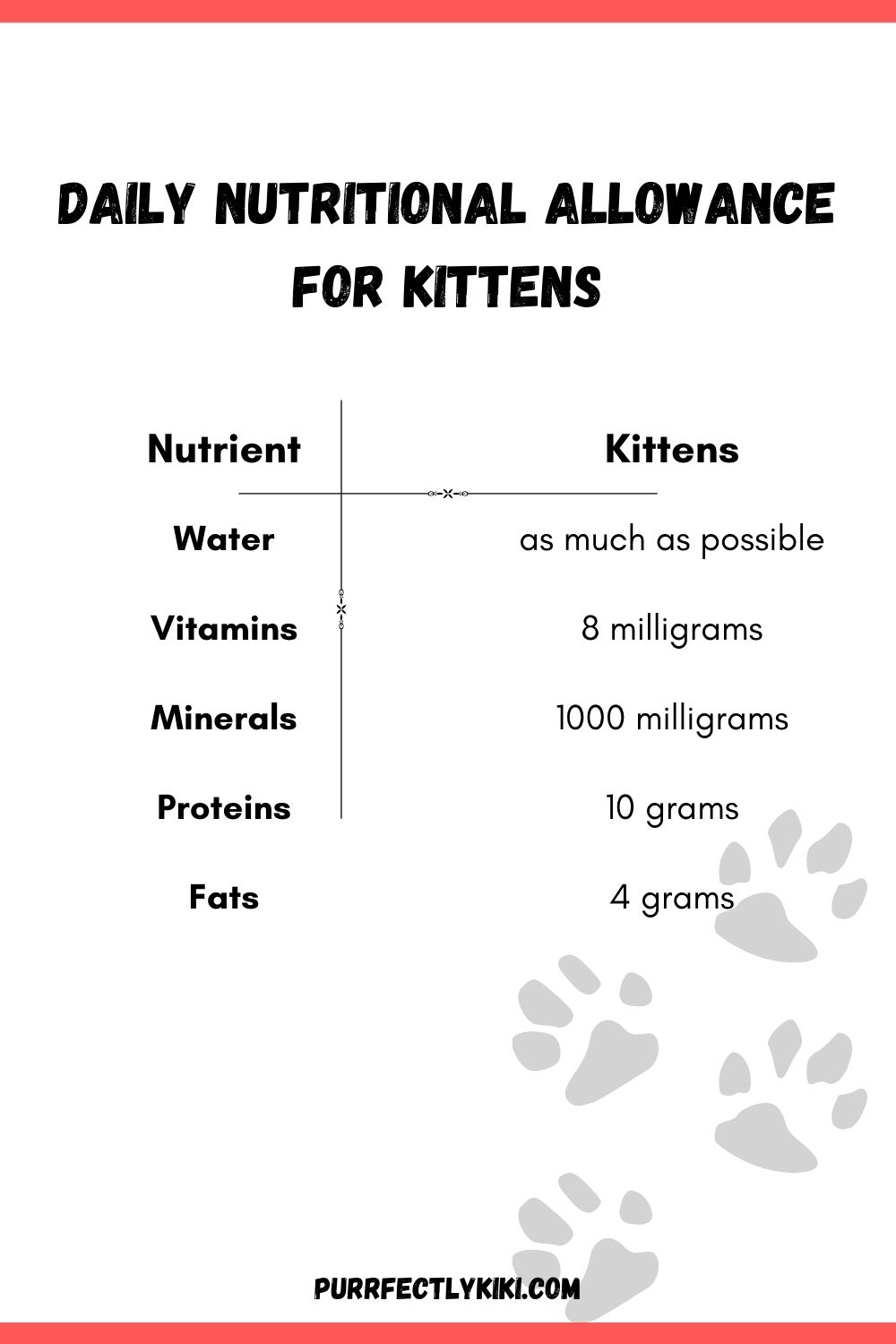
| Nutrient | Adult Cats |
|---|---|
| Water | as much as possible |
| Vitamins | 6 mgs |
| Minerals | 800 mgs |
| Protein | 12.5 gms |
| Fat | 5.5 gms |
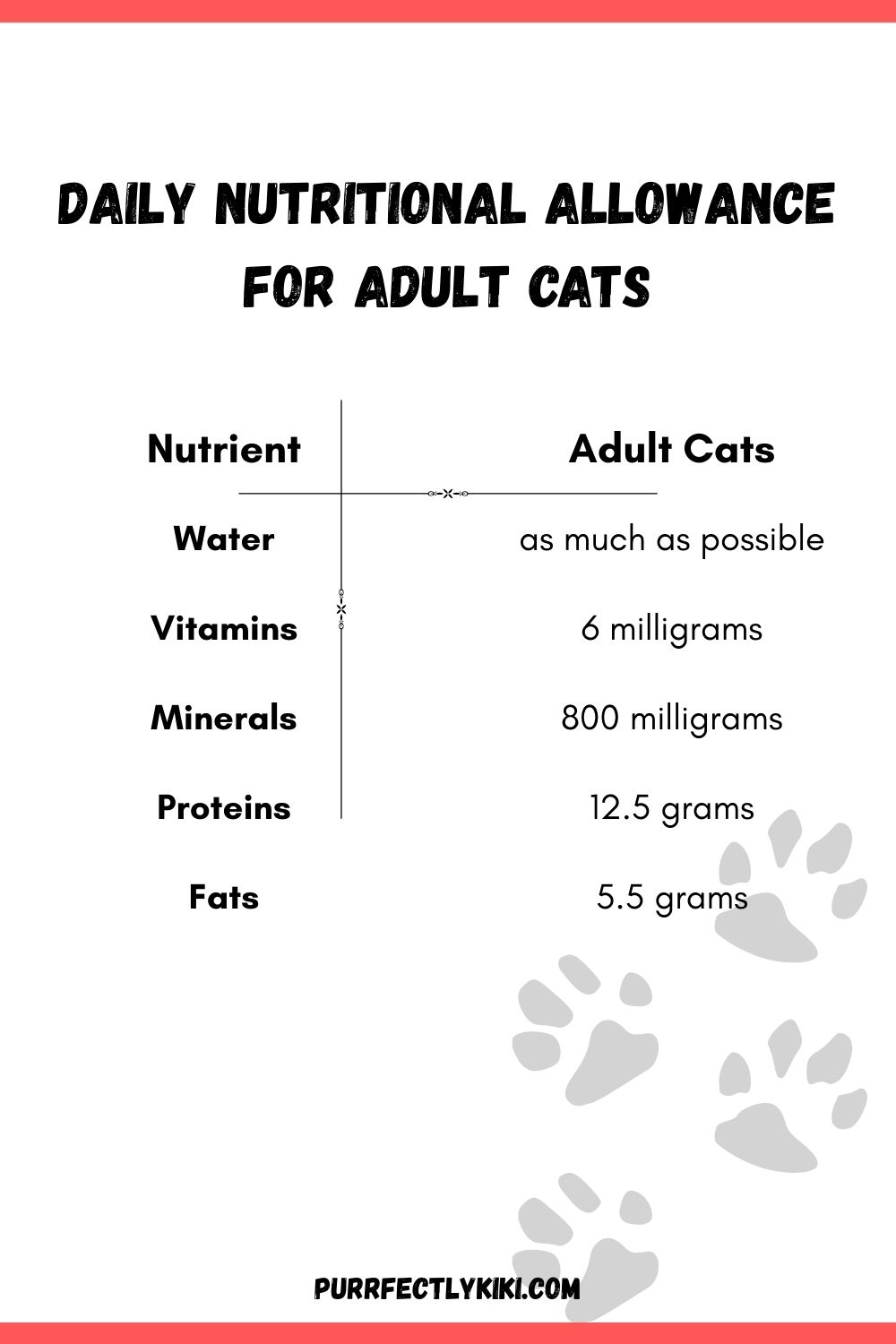
| Nutrient | Senior Cats |
|---|---|
| Water | as much as possible |
| Vitamins | 10 mgs |
| Minerals | 1200 mgs |
| Protein | 41 gms |
| Fat | 12 gms |
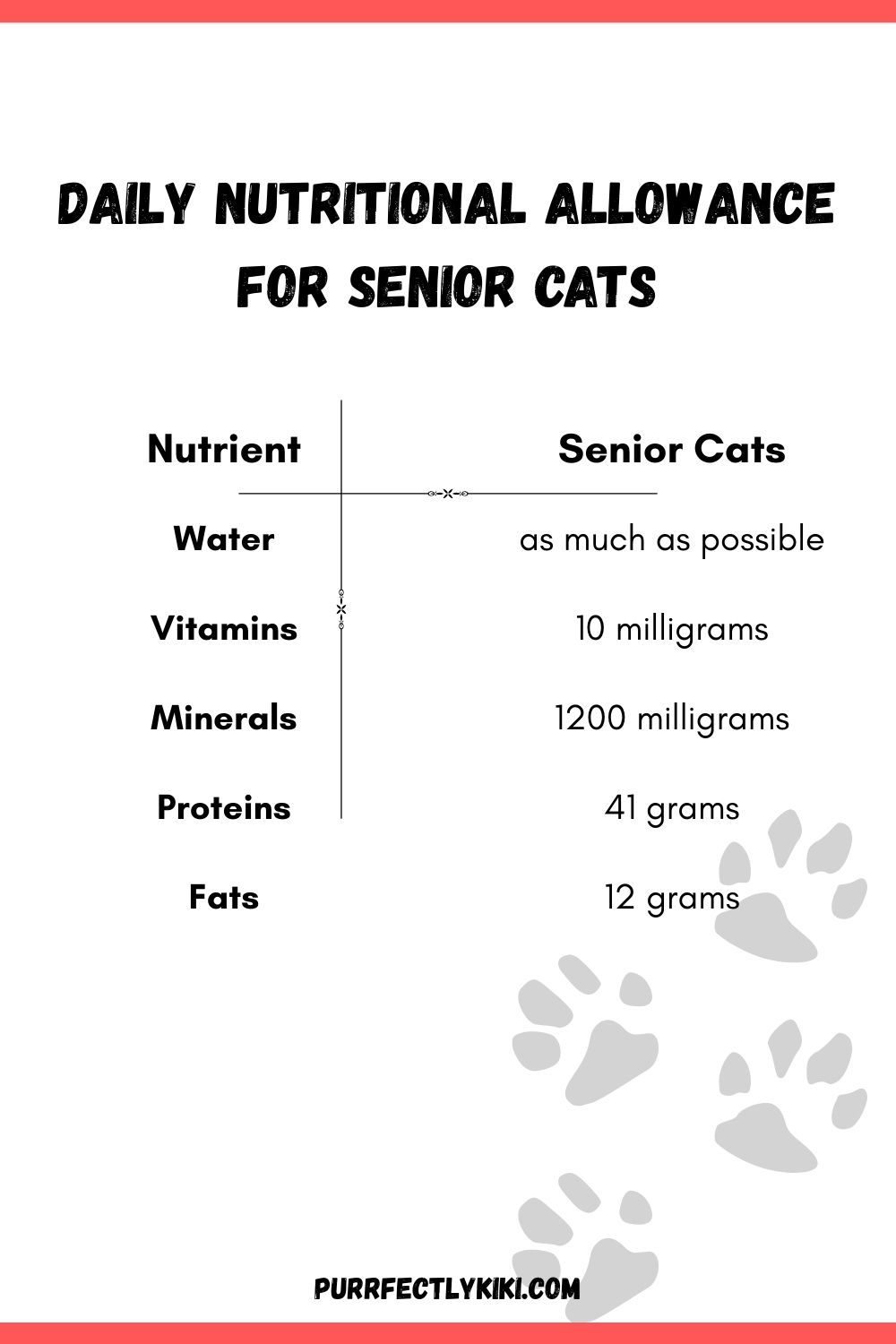
5 Important Cat Nutrition Requirements
Let’s start with the basic needs every cat requires, such as water, proteins, fats, vitamins, and minerals.
- Water
- Vitamins
- Minerals
- Protein
- Fatty Acids
Most food brands have these nutrients, except for the water, which you need to add separately.
Now, let’s dive a bit deeper into each nutritional requirement:
1. Water
Water is key for our little furry friends’ health as it supports their cells and overall body functions. Cats naturally lose water through their lungs, skin, urine, milk, and feces.
That said, their diet plays a very important role in meeting their water needs, with unprocessed proteins and water-rich foods being essential for good nutrition. Canned cat food is designed with water content in mind, and it often provides up to 80% of a cat’s daily water requirement per serving.
2. Vitamins
Next, we have vitamins, which are immensely important for cats because they help with immunity, growth, and organ function.
There are two types of vitamins that cats need:
- Fat-soluble – can be stored in fat cells
- Water-soluble – need to be replenished more often
Cats get vitamins naturally from raw cat food or minimally processed foods like chicken, meat, and fish. Dry foods add synthetic vitamins since natural ones can be lost during processing, and while there’s no set standard for vitamin intake in cats, it still remains a key part of their overall health.
3. Minerals
Minerals are also important for cats to balance acidity, and to support tissue and enzyme function.
The key minerals that cats need include the following:
- Calcium
- Phosphorus
- Sodium
- Potassium
- Magnesium
- Iron
- Copper
- Zinc
- Iodine
It is important to have the right balance of these minerals in your cat’s diet. So make sure to consult a vet or nutritionist to help ensure your cat gets balanced mineral amounts.
4. Protein
Protein is vital for cats’ muscles, bones, and overall body functions as it makes up important parts like enzymes and hormones. Some proteins, like those found in fish and chicken, are easier for cats to use than others, like those from plants or dairy.
Proteins contain essential amino acids that cats need from their diet as it directly affects a cat’s health. Good cat food uses unprocessed or minimally processed fish, poultry, and meat that provide at least 40% of a cat’s protein needs per serving.
5. Fatty Acids
Fats are a key energy source for cats and carry important vitamins. They also provide essential fatty acids like linoleic and arachidonic acids, important for good health. Cats lacking fats might show signs like slow growth, dry hair, low energy, and vulnerability to infections.
So keep in mind this nutrient the next time you go out to buy cat food as it needs to have around 20% to 40% of fat content.
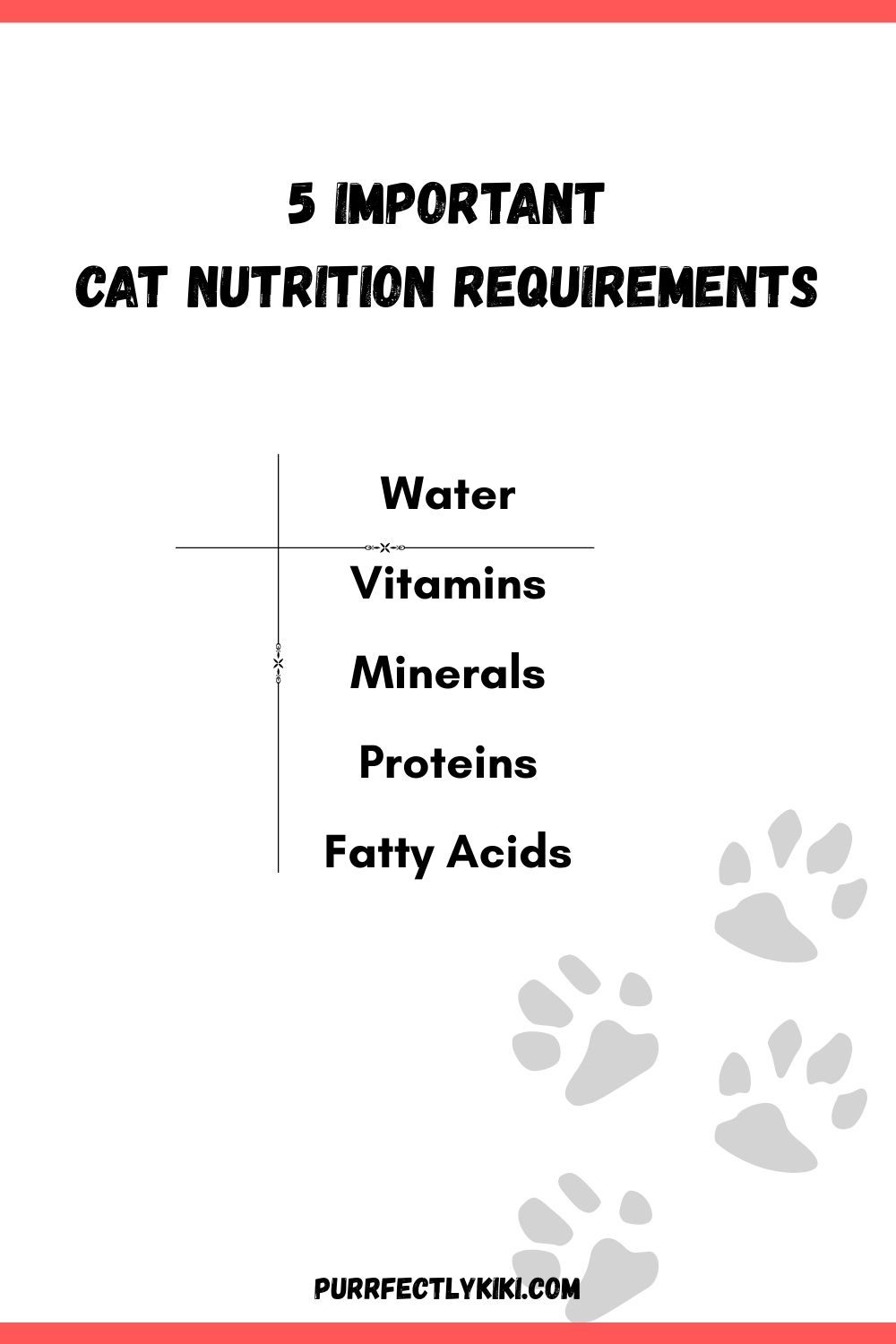
Why a Balanced Diet is Equally Important
Needless to say that selecting the right cat food is extremely important for your cat’s health. A quality and balanced diet keeps them at good weight, supports healthy skin and fur, and also aids in digestion.
Furthermore, when cats eat a balanced diet, it can prevent chronic illnesses. On the other hand, not consuming a balanced diet may create health issues for your cat, like obesity and diabetes that come with too much carb consumption.
Therefore, always include protein in your kitty’s diet, as the lack of protein may cause muscle loss. Also, avoid giving your little furry baby any sort of human food as it can upset their stomach or make them sick.
Our Kiki, for instance, doesn’t have this problem because she doesn’t like human or any homemade cat food (lucky for us too). She’ll jump on the table, sniff it out, and then go to eat her own food. Although, we have to admit that she does like the taste of bread, but we make sure to give her only two to three crumbs.
Feeding quality and fresh cat food to your furry baby isn’t just about physical health but also their mood. Quality food gives them the nutrients they need for a long and active life.
To keep your cat healthy and happy, choose a quality and balanced diet with all the nutrients they need.
🐾 It is imperative to understand that a balanced diet is necessary for a cat to remain healthy. However, skipping once or twice isn’t anything serious, provided you don’t neglect your cat’s needs for a prolonged period of time.
How Cat Food Affects Your Cat’s Skin & Coat Health
Skin and coat health of your cat is extremely important for their overall well-being. It acts as a shield against various irritants and helps regulate their body temperature by reducing water loss.
A balanced diet helps regulate and keep your cat’s skin and coat as healthy as possible. With that in mind, there are also various factors that affect skin health, such as the environment, your cat’s age, the breed, its genetics, and their hygiene.
Here’s what you need to know to improve your cat’s skin and coat health:
a) Healthy Cat Food Requirements
Cats need a specific set of nutrients to keep their skin and coat healthy. Their skin has three layers with different types of hair, and each needs its own nutrients. A diet that provides a healthy chunk of proteins and minerals will keep your purry friend’s skin and coat healthy.
Even though genetics play a huge role, selecting the right diet that is rich in all necessary nutrients can help your cat develop strong and healthy skin and coat.
- Protein
- Fatty Acids
- Vitamins & Minerals
Protein
We’ve mentioned before that protein is a vital nutrient needed in every cat’s diet, and it is the case here as well. Protein supports cell renewal and strong hair growth through its keratin.
The skin constantly renews its cells and it needs about 30% of your cat’s daily protein. Without enough protein, their hair may become thin or brittle and lose its protective abilities.
Fatty Acids
Essential fatty acids, like omega-3 and omega-6, are also vital as they maintain skin integrity and promote healthy hair growth. Cats can’t make these acids internally, so they must get them from their diet.
Therefore, without enough essential fatty acids, their hair may mat or become discolored, and their skin could become scaly.
Vitamins & Minerals
When it comes to cats’ skin and coat, vitamins play a role too. Vitamin A regulates cell growth, B vitamins help metabolize nutrients, and vitamin E supports the immune system in their skin. A general lack of these vitamins can lead to hair loss, a poor coat, and skin issues.
Minerals like zinc and copper are essential for healthy skin and hair. Zinc is vital for cell functions, while copper helps with hair pigmentation. A diet that lacks these minerals can result in a poor-quality coat and slow hair growth.
🐾 Do not neglect the importance of healthy food when you feed cats, as these essential nutrients like proteins, fatty acids, vitamins, and minerals are exactly what our furry little friends need.
b) Weight Management & Urinary Tract Health
Lower urinary tract disease affects many cats globally, and it is often without a clear cause. This is why it’s extremely important to know how to help your cat maintain a healthy urinary system as it can greatly impact their overall health.
Your cat’s urinary system, including their tiny kidneys and bladder, are responsible for filtering waste from their body. Kidney issues can hinder waste removal, while bladder problems like inflammation, stones, or even obstruction can affect your cat’s comfort and health.
Therefore, it’s important to properly manage your kitty’s weight and provide quality food to help their urinary tract.
- Maintain Healthy Weight
- Common Urinary Tract Problems
Maintain Healthy Weight
Keeping your cat at a healthy weight is vital to avoid various problems like diabetes, arthritis, and heart disease. Quality and healthy cat food with the right mix of nutrients such as protein, fats, and carbs gives them energy without causing weight gain.
Healthy digestion is vital for cats to get the nutrients they need since cats need animal-based proteins. A good diet includes easily digestible proteins like chicken or fish, in addition to fiber from ingredients like brown rice or sweet potatoes, which keeps their bowels regular and prevents issues like constipation or diarrhea.
Probiotics also support gut health by balancing good bacteria, aiding digestion and nutrient absorption, which tremendously affect a cat’s health.
🐾 Look for foods with 25-40% protein to help them stay lean and healthy, while also giving them enough energy to run around and play throughout the day.
Common Urinary Tract Problems
Cats can have different urinary problems, especially in their lower urinary tract. One common issue is urolithiasis, where crystals or stones form in the bladder due to concentrated urine. These stones can cause pain and blockages in urination.
Another problem is idiopathic inflammation, which means inflammation without a clear cause. Cats can also get urinary infections from bacteria, leading to discomfort and issues with peeing. Sometimes, cats may develop tumors or mucus plugs, making urination difficult.
🐾 It is important for cat owners to know about these urinary problems so they can spot signs early and get their cats the right care. Regular vet visits, a healthy diet, and plenty of water can help keep cats’ urinary systems healthy and happy.
Wrapping Up
Understanding how cat food affects your cat’s health is vital for their overall well-being. By providing a balanced diet rich in essential nutrients like water, proteins, vitamins, minerals, and fatty acids, you can ensure healthy skin, coat, weight management, and urinary tract function.
However, remember that genetics, environment, and diet quality play significant roles in your cat’s health. Prioritizing their nutrition and hydration sets the foundation for a long, active, and happy life for your beloved little cat.
